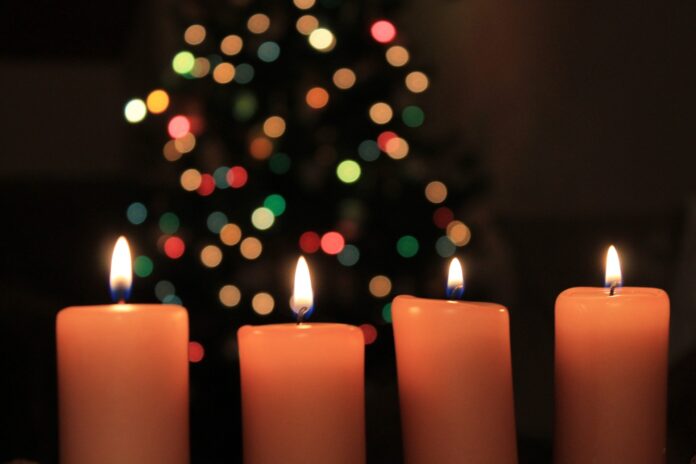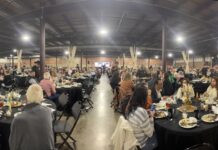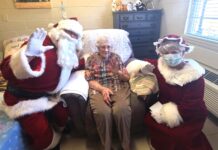
CULLMAN, Ala. – With the increased use of fireplaces and space heaters, celebratory candles and decorative lights and electronics, the chance of fire-related incidents increases around the winter holidays. Cullman Fire Rescue Chief Brian Bradberry, Cullman Fire Inspector Jason Heaton and Berlin Volunteer Fire Department Chief Ralph Laney offer tips on how to avoid common fire mishaps.
According to Bradberry, “Many of the fires that we encounter this time of year are due to cooking, flammable objects placed close to heat sources and overloaded electrical circuits.”
Fireplaces and fire pits
Laney: “Anything flammable needs to be at least 6 feet away from the fireplace, and I’d say clear out at least 10 feet away from an outdoor bonfire. Make sure the fire’s at least 10 feet away from any structures, too, and keep a water hose ready in case your bonfire does get out of control.”
Bradberry & Heaton: “Have heating equipment and chimneys cleaned and inspected every year by a qualified professional. Use a grate or screen in front of the fireplace, and keep stockings and other decorations out from in front of it while lit. Never start any fire with gasoline or lighter fluid; instead, use crumpled paper or a store-bought fire starter covered with small sticks. Avoid burning pine or cedar, as they can pop and throw sparks. Finally, make sure you know your local ordinances about fires and be aware of any burn bans in effect for your area.”
Candles
Bradberry & Heaton: “Your best bet is to use flameless battery-operated candles; however, if you use real candles then make sure their holders are stable, they are located in a place where they won’t be easily knocked over and anything flammable is kept at least 12 inches away from them. Never hang real candles on a tree. Be vigilant, because candles cause roughly half of all home decoration fires during the month of December.”
Kitchen/cooking fires
Laney: “Get a small fire extinguisher from Wal-Mart or somewhere like that; make sure you know how to use it and keep it somewhere you can easily grab it. Be really cautious about not walking off and leaving anything unattended.”
Bradberry & Heaton: “If you have to leave the kitchen, make sure to turn the burner off. Also turn the burner off if you start seeing smoke or your oil or grease starts boiling. These tips are especially important if you have a gas burner instead of induction. If you have a fire inside a pot, keep the lid handy and slowly slide it over the top to smother the flame. Make sure to clean out any crumbs or food particulate from your oven, toaster and other appliances, and fires inside the oven should be left to burn themselves out after turning off the heat.”
Space heaters and other electronics
Laney: “Space heaters are very dangerous. I had a person talk to me just this morning who said they had a space heater that flamed up, so they pulled the cord out and threw the heater outside and the fire just got bigger. If they hadn’t been at home, their whole house would have burned down. If you have a space heater and you need to leave the house, you should unplug it and leave it unplugged until you get back. You also need to keep anything flammable at least 3 or 4 feet away from it.”
Bradberry & Heaton: “If you use a real tree, make sure the bottom is cut fresh and keep it watered every day. Dry trees can act like kindling and burn fast and hot. Throw out any light strands with frayed or exposed wires and be sure to read the manufacturer’s instructions on the appropriate number of light strands to connect. Keep your tree at least 3 feet away from heat sources like space heaters, radiators and heat vents. Use space heaters with tip-over safety switches that turn off automatically and turn them off when you leave a room or go to bed.”
Fireworks
Laney: “Use a little common sense – don’t shoot anything toward anyone, make sure they’re fired away from dwellings, and don’t be holding them in your hand when you light them. Make sure they’re firmly on the ground and won’t tip over when they launch.”
Other general tips:
- Check smoke alarms and carbon monoxide detectors and make sure they have good batteries and are in good working order.
- Have a working fire extinguisher or two.
- Have gas lines inspected before you turn the heat on for the first time.
- Do not use outdoor heating or cooking devices for indoor heat.
- If using heat lamps to protect pets or plants, make sure those devices are not mounted on, close to, or pointing directly at combustible materials.
- Close doors in your home before going to sleep to help slow or stop fire spread.
- Do not block doors/exits with furniture or decorations.
- Always have a fire escape plan and go over it with visitors. Once out of the house, stay out and call 911.
Copyright 2020 Humble Roots, LLC. All Rights Reserved.




























